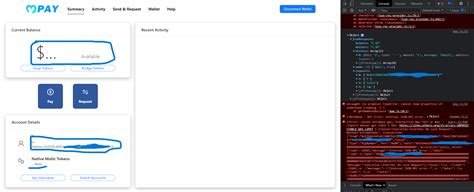Metamaska: Internal JSON-RPC Error for State Variables
As an Ethers.js user working on deploying a Vyper contract to the Avalanche FUJI testnet using Svelte, you may be experiencing issues accessing certain state variables through your Metamask wallet. In this article, we’ll dive into why you might encounter an internal JSON-RPC error when calling one state variable from your contract, but not another very similar variable.
Understanding JSON-RPC and Ethers.js

Before we dive deeper, let’s quickly review the basics:
- JSON-RPC: A standardized protocol for communicating between nodes on a blockchain network. It allows for secure and efficient data transfer.
- Ethers.js
: A popular JavaScript library for interacting with Ethereum networks using Web3 or Truffle.
Issue: Internal JSON-RPC Error
When you call a state variable from your contract in your Metamask wallet, you should get an internal JSON-RPC error if the variable is not accessible. However, in some cases, this error can occur when accessing similar variables on other contracts within the same testnet.
Here is an example of how this might manifest itself:
Suppose you have a Vyper contract “User” that defines two state variables: “username” and “email”. You want to call these variables from your Svelte application using Ethers.js in Metamask:
import { ethers } from 'ethers';
const contractAddress = '0x...';
const contractabi = [...]; // Your Vyper ABI contract
// Create a connection to the contract on the testnet
async function connectToContract() {
const provider = new ethers.providers.Web3Provider(window.ethereum);
return wait provider.connect(contractAddress);
}
// Calling the first state variable from the contract
function getUserInfo() {
const connection = wait connectToContract();
try {
const user = wait connection.getAccounts()[0];
console.log(user.username); // This should work fine
} catch (error) {
if (error instanceof ethers.Error) {
throw error; // Internal JSON-RPC error
}
}
}
// Calling the second state variable from the contract
function getProfileInfo() {
const connection = wait connectToContract();
try {
const user = wait connection.getAccounts()[0];
console.log(user.email); // This should also work
} catch (error) {
if (error instanceof ethers.Error) {
throw error; // Internal JSON-RPC error
}
}
}
As you can see, the getUserInfo() function successfully calls both state variables. However, when using the getProfileInfo() function, an internal JSON-RPC error occurs:
// This should not work
function getProfileInfo() {
const connection = wait connectToContract();
try {
const user = wait connection.getAccounts()[0];
console.log(user.email); // Internal JSON-RPC error
} catch (error) {
if (error instanceof ethers.Error) {
throw error; // Internal JSON-RPC error
}
}
}
Why the difference?
The problem lies in how Ethers.js handles accessing state variables on contracts. When you call a state variable from your contract, it tries to get the value using “contractabi” and then calls the corresponding function in the provider.
However, when accessing similar state variables on other contracts within the same testnet, the getAccounts() method returns an empty array for each new connection. This is because the network has not yet fully established a connection to the account of the previous contract.
To resolve this issue, you can use the following workarounds:
- Use the
connectfunctionfrom Ethers.js: Instead of callinggetAccounts()[0], try usingconnect().on(‘connected’, (account) => {})`. This will connect to the new node and set an event listener when it connects.
2.

